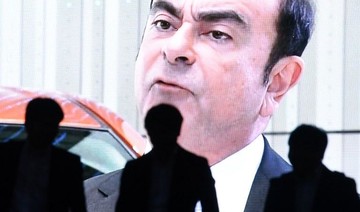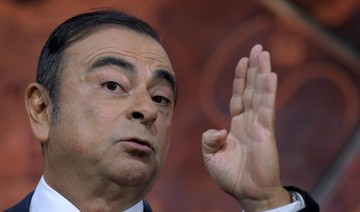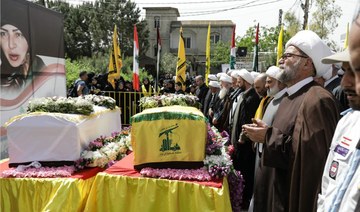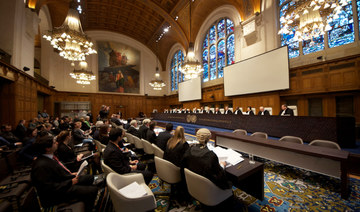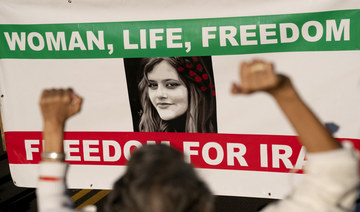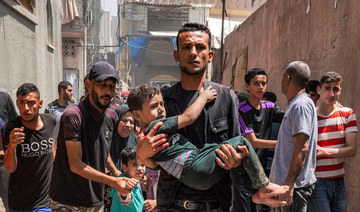BEIRUT: He may have fallen from grace internationally as one of the auto industry’s most powerful leaders, but Carlos Ghosn can count on continued support in at least one corner of the globe.
Lebanon has long held hopes that Ghosn, whose grandparents were Lebanese and who holds extensive development projects in the country, would play a bigger role in politics one day, or help rescue its increasingly sluggish economy.
But Ghosn, ex-chairman of Nissan Motor Co., was detained last month on allegations of underreporting his income, and on Friday, a Japanese court approved extending his detention for 10 more days.
Now, politicians across the board are mobilizing in his defense, with some suggesting his detention may be part of a political or business-motivated conspiracy, and the government even considering extraditing him from Tokyo to face trial here.
“To Carlos Ghosn in his predicament I say, a Lebanese phoenix will not be scorched by the Japanese sun,” Interior Minister Nohad Machnouk said at a security conference in Beirut this week.
Lebanon, a tiny country of 4.5 million, takes excessive pride in its huge emigrant community and successful businessmen and celebrities of Lebanese heritage. They include Mexican business magnate Carlos Slim, Columbian singer Shakira, Mexican-American actress Salma Hayek, Lebanese-British barrister Amal Clooney and fashion designers Elie Saab and Reem Accra.
The Lebanese took special pride in the auto industry icon, who holds a Lebanese passport, speaks fluent Arabic and visits regularly, including a last visit right before he was detained in Tokyo. Born in Brazil, where his Lebanese grandfather had sought his fortune, Ghosn grew up in Beirut, where he spent part of his childhood at a Jesuit school.
As he began his ascent in the auto industry, first with Renault and then by bringing Nissan in Tokyo back from the brink of bankruptcy, Ghosn kept in touch with old friends. He married twice, first to a Lebanese woman who resides in Beirut and again in 2016 to Carole Nahas, also of Lebanese heritage.
As a Maronite Christian, Ghosn’s name occasionally popped up as a possible candidate for the presidency, but he repeatedly dismissed suggestions he would run for office, saying he is not a politician. The post of president is reserved for a Christian in Lebanon’s sectarian-based system of government.
Although the extent of his businesses in Lebanon is not known exactly, Ghosn has spoken in interviews about various real estate projects in the country and sits on the board of several universities, hospitals and charities. In 2012, he became a partner in the Lebanese winery IXSIR, and is a board member of family-owned Saradar Bank.
In 2017, the government honored him with a special postage stamp — a show of respect to a man considered a model of Lebanese entrepreneurial spirit.
So when news broke on Nov. 19 that Ghosn, 64, had been detained on allegations he underreported millions of dollars in income, and that Nissan is accusing him of using company money for personal gain, people in Lebanon were stunned — and many were unconvinced.
Lebanese Foreign Minister Gibran Bassil promptly issued a statement saying Lebanon would stand by Ghosn, adding he had asked the Lebanese ambassador to Tokyo to look out for “the model of Lebanese success abroad.” The ambassador has since reportedly met three times with Ghosn — who is being held in a small cell in the Japanese capital — providing him with a mattress and food in the form of salmon, according to one report on a local TV channel.
Ghosn’s dramatic downfall has sparked various conspiracy theories, with some claiming that his arrest was a U.S. ploy to punish him for resisting sanctions on Iran and others speculating it was an internal coup engineered by Nissan executives.
Melhem Riachi, the information minister, urged officials to intervene with the government of Japan, tweeting: “An investigation is extremely important. Something stinks.”
Allegations against Ghosn reported in the Japanese media, but unconfirmed, suggest he spent Nissan funds on fancy homes in Paris, Beirut, Rio de Janeiro and Amsterdam, and on family vacations and other personal expenses. Ghosn has denied the allegations against him, saying he had no intention of underreporting his income, the reports say.
Ghosn’s three-story property in one of Beirut’s most prized real estate districts stands out for its pink walls and blue shuttered windows. The traditional old Lebanese house was acquired and renovated in 2014, according to neighbors who said they occasionally saw him visiting.
“He is a successful businessman with a good reputation ... he is not someone you would expect to be a cheat,” said Rouba Rabah, who owns an art gallery opposite Ghosn’s property.
Another neighbor who declined to give his name said he was stunned by the news like every other Lebanese would be, recalling how he would see Ghosn personally overseeing the renovation work four years ago.
Lebanese businessmen, many of them personal friends of Ghosn, have rallied around him, even after he was stripped of his title as chairman at Nissan and at Japanese partner Mitsubishi Motors Corp.
A group of Lebanese lawyers is now considering forming a team for his defense, and Justice Minister Salim Jreissati told Lebanon’s daily An-Nahar that the government is considering asking Japan to extradite Ghosn to face trial on Lebanese soil.
Lawyer Amal Haddad told The Associated Press that she and the current head of the Lebanese Lawyers’ Syndicate, Andree Chidiac, were considering the options. “That’s all I can say until we are formally assigned the case,” Haddad said.
In Ghosn’s downfall, many here see a lost opportunity. The country’s economy is struggling, with experts warning it is dangerously close to collapse after decades of mismanagement, corruption and nepotism.
Cabinet Minister Mouin Merhebi said that Ghosn’s arrest is regrettable.
“He is an important personality, an economic personality we had hoped would one day play a role in Lebanese political life, a role to salvage Lebanon,” he told the AP.
Dramatic downfall of Carlos Ghosn reverberates in Lebanon
Dramatic downfall of Carlos Ghosn reverberates in Lebanon
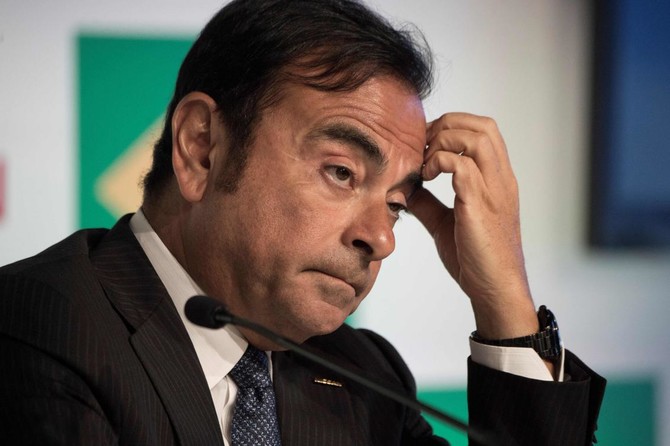
- Lebanon has long held hopes that Ghosn would play a bigger role in politics one day, or help rescue its increasingly sluggish economy
- The country’s economy is struggling, with experts warning it is dangerously close to collapse after decades of mismanagement, corruption and nepotism
Lebanese Christian leader says Hezbollah’s fighting with Israel has harmed Lebanon

- Samir Geagea of the Lebanese Forces Party said Hezbollah should withdraw from areas along the border with Israel
- The Lebanese army should deploy in all points where militants of the Iran-backed group have taken positions
`MAARAB, Lebanon: The leader of a main Christian political party in Lebanon blasted the Shiite militant group Hezbollah for opening a front with Israel to back up its ally Hamas, saying it has harmed Lebanon without making a dent in Israel’s crushing offensive in the Gaza Strip.
In an interview with AP on Tuesday night, Samir Geagea of the Lebanese Forces Party said Hezbollah should withdraw from areas along the border with Israel and the Lebanese army should deploy in all points where militants of the Iran-backed group have taken positions.
His comments came as Western diplomats try to broker a de-escalation in the border conflict amid fears of a wider war.
Hezbollah began launching rockets toward Israeli military posts on Oct. 8, the day after Hamas-led militants stormed into southern Israel in a surprise attack that sparked the crushing war in Gaza.
The near-daily violence has mostly been confined to the area along the border, and international mediators have been scrambling to prevent an all-out war. The fighting has killed 12 soldiers and 10 civilians in Israel. More than 350 people have been killed in Lebanon including 273 Hezbollah fighters and more than 50 civilians.
“No one has the right to control the fate of a country and people on its own,” Geagea said in his heavily guarded headquarters in the mountain village of Maarab. “Hezbollah is not the government in Lebanon. There is a government in Lebanon in which Hezbollah is represented.” In addition to its military arm, Hezbollah is a political party.
Geagea, whose party has the largest bloc in Lebanon’s 128-member parliament, has angled to position himself as the leader of the opposition against Hezbollah.
Hezbollah officials have said that by opening the front along Israel’s northern border, the militant group has reduced the pressure on Gaza by keeping several Israeli army divisions on alert in the north rather than taking part in the monthslong offensive in the enclave.
“All the damage that could have happened in Gaza ... happened. What was the benefit of military operations that were launched from south Lebanon? Nothing,” Geagea said, pointing the death toll and massive destruction in Lebanon’s border villages.
Israel’s war against Hamas in Gaza has killed more than 34,000 Palestinians, caused wide destruction and displaced hundreds of thousands to the city of Rafah along Egypt’s border. Israel’s Prime Minister Benjamin Netanyahu vowed Tuesday to launch an offensive into the southern Gaza city of Rafah despite international calls for restraint.
Geagea said Hezbollah aims through the ongoing fighting to benefit its main backer, Iran, by giving it a presence along Israel’s border and called for the group to withdraw from border areas and Lebanese army deploy in accordance with a UN Security Council resolution that ended the 34-day Israel-Hezbollah war in 2006.
Geagea also discussed the campaign by his party to repatriate Syrian refugees who fled war into Lebanon.
Those calls intensified after a Syrian gang was blamed for last month’s killing of Lebanese Forces official Pascal Suleiman, allegedly in a carjacking gone wrong, although many initially suspected political motives.
Lebanon, with a total population of around 6 million, hosts what the UN refugee agency says are nearly 785,000 UN-registered Syrian refugees, of which 90 percent rely on aid to survive. Lebanese officials estimate there may be 1.5 million or 2 million, of whom only around 300,000 have legal residency.
Human rights groups say that Syria is not safe for mass returns and that many Syrians who have gone back — voluntarily or not — have been detained and tortured.
Geagea, whose party is adamantly opposed to the government of President Bashar Assad in Syria, insisted that only a small percentage of Syrians in Lebanon are true political refugees and that those who are could go to opposition-controlled areas of Syria.
The Lebanese politician suggested his country should follow in the steps of Western countries like Britain, which passed controversial legislation last week to deport some asylum seekers to Rwanda.
“In Lebanon we should tell them, guys, go back to your country. Syria exists,” said Geagea, who headed the largest Christian militia during Lebanon’s 1975-90 civil war.
Turkiye to join South Africa’s genocide case against Israel at World Court, minister says
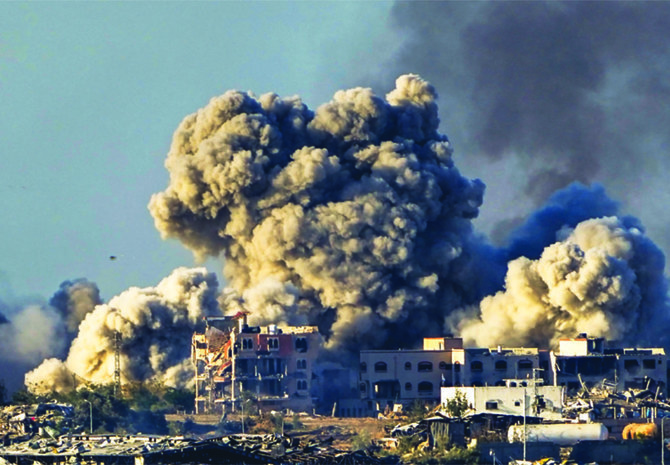
- “Turkiye will continue to support the Palestinian people in all circumstances,” Fidan said
- In January, President Tayyip Erdogan said that Turkiye was providing documents for the case at the ICJ
ISTANBUL: Turkish Foreign Minister Hakan Fidan said on Wednesday that Turkiye would join in South Africa’s genocide case against Israel at the International Court of Justice (ICJ).
“Upon completion of the legal text of our work, we will submit the declaration of official intervention before the ICJ with the objective of implementing this political decision,” Fidan said in a joint press conference with Indonesia’s Foreign Minister Retno Marsudi in Ankara.
“Turkiye will continue to support the Palestinian people in all circumstances,” he said.
The ICJ ordered Israel in January to refrain from any acts that could fall under the Genocide Convention and to ensure its troops commit no genocidal acts against Palestinians, after South Africa accused Israel of state-led genocide in Gaza.
In January, President Tayyip Erdogan said that Turkiye was providing documents for the case at the ICJ, also known as the World Court.
Israel and its Western allies described the allegation as baseless. A final ruling in South Africa’s ICJ case in The Hague could take years.
Iran files charges over BBC report on teen girl allegedly killed by security forces in 2022 protests
Iran files charges over BBC report on teen girl allegedly killed by security forces in 2022 protests
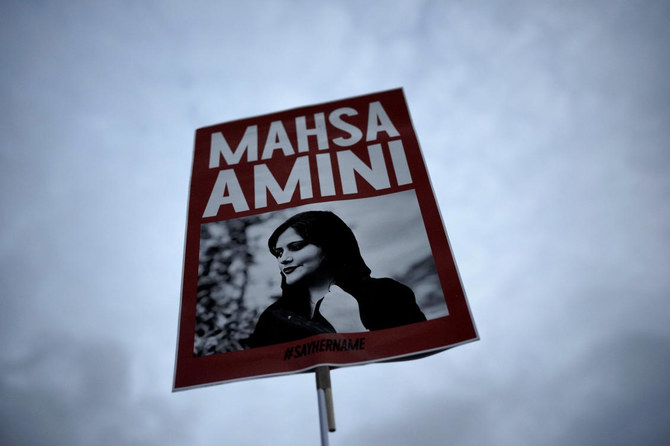
- Nika Shakarami’s death also sparked widespread outrage at the time
- Amini died after being detained by police over allegedly not wearing her mandatory hijab, or headscarf, to their liking
JERUSALEM: Iranian prosecutors filed criminal charges on Wednesday targeting activists and journalists following a BBC report that alleged security forces had “sexually assaulted and killed” a 16-year-old girl during protests over the death of Mahsa Amini in 2022.
Nika Shakarami’s death also sparked widespread outrage at the time.
Amini died after being detained by police over allegedly not wearing her mandatory hijab, or headscarf, to their liking. UN investigators have said Iran is responsible for the “physical violence” that led to Amini’s death.
In Shakarami’s case, authorities said she died after falling from a tall building, something immediately disputed by her mother, who said her daughter had been beaten.
The BBC report published on Monday — relying on what it described as a report written for Iran’s paramilitary Revolutionary Guard — said Shakarami was detained by undercover security forces who molested her, then killed her with batons and electronic stun guns after she struggled against the assault.
Iran’s Mizan news agency, run by the country’s judiciary, said on Wednesday that the BBC story was “a fake, incorrect and full-of-mistakes report,” without addressing any of the alleged errors it contained.
It was the government’s first acknowledgment of the BBC report and it said “journalists and activists” have been summoned over the issue.
“The Tehran Prosecutor’s Office filed a criminal case against these people,” Mizan said, with charges including “spreading lies” and “propaganda against the system.” The first charge can carry up at a year and a half in prison and dozens of lashes, while the second can involve up to a year’s imprisonment.
Mizan did not identify those charges and it was unclear whether prosecutors had charged three BBC journalists who bylined the report. Those associated with the BBC’s Persian service have been targeted for years by Tehran and barred from working in the country since its disputed 2009 presidential election and Green Movement protests.
The BBC did not immediately respond to a request for comment. The broadcaster noted that in recent years, there have been faked documents floating around during widespread protests, purporting to be from the Iranian government.
However, it said it had “confidence that it is genuine,” despite an inconsistency in the report using an old acronym for the police.
Iranian Interior Minister Ahmad Vahidi on Wednesday tried to dismiss the BBC report as an effort to “divert attention” from ongoing protests at American universities over the Israel-Hamas war — despite the events dominating US television networks.
“The enemy and their media have resorted to false and far-fetched reports to conduct psychological operations,” Vahidi said, according to the state-run IRNA news agency.
UAE braced for severe weather, task force on high alert
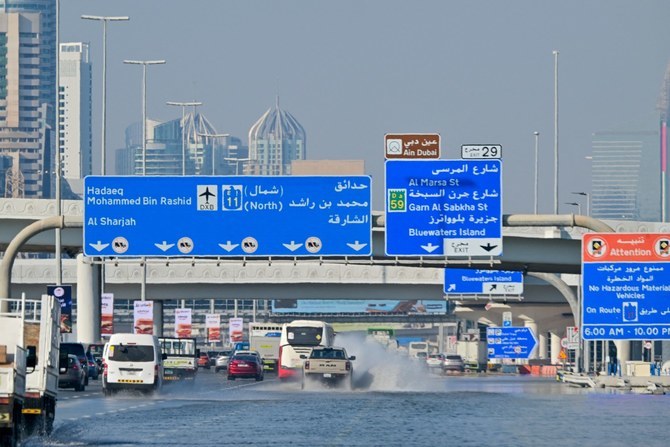
- UAE’s disaster management authority warns residents to expect rain, storms over next two days
- All private schools in UAE to switch to remote learning as precaution on Thursday and Friday
DUBAI: Challenging weather is again expected in the UAE, with parts of the country’s east coast set to experience strong winds.
The National Emergency Crisis and Disaster Management Authority said gusts of up to 40 kph were likely to impact the area on Thursday.
While the NCM forecasts less severe conditions than those in April, it has warned residents to expect rain and storms over the next two days. There is a possibility of hail in the eastern regions, possibly extending to some internal and western areas.
Clouds are expected to decrease on Friday and Saturday, with possible light to medium rain which may be heavier in some southern and eastern regions.
Government agencies are coordinating with the Joint Weather and Tropical Assessment Team to monitor developments, said a statement from the NCM.
The teams will assess the potential impact of weather conditions and implement proactive measures where necessary.
Dubai’s government announced all private schools in the UAE would switch to remote learning on Thursday and Friday as a precaution.
Authorities have urged the public to exercise caution, adhere to safety standards and guidelines, refrain from circulating rumors, and rely on official sources for information.
The UAE is still recovering from last month’s storms which caused widespread flooding, submerging streets and disrupting flights at Dubai International Airport.
Hamas official insists Gaza ceasefire must be permanent

- Suhail Al-Hindi, a senior Hamas official said the group would “deliver its response clearly within a very short period“
- He stressed the aim was “to reach an end to this war“
GAZA, Palestinian Territories: Hamas will respond to an Israeli truce proposal for Gaza “within a very short period,” an official with the Palestinian militant group said Wednesday, stressing though that any ceasefire needs to be permanent.
Hamas is considering a plan for a 40-day ceasefire and the exchange of scores of hostages for larger numbers of Palestinian prisoners.
Suhail Al-Hindi, a senior Hamas official, told AFP the group would “deliver its response clearly within a very short period,” although he would not say precisely when that was expected to happen.
Speaking to AFP by phone from an undisclosed location, he said it was premature to say whether the Hamas envoys, who have returned from talks in Cairo to their base in Qatar, felt any progress was made.
He stressed the aim was “to reach an end to this war.”
But that would seem to be at odds with Israel’s determination to push ahead with its vast ground offensive in southern Gaza.
A source with knowledge of the negotiations said Qatari mediators expected a response from Hamas in one or two days.
The source said Israel’s proposal contained “real concessions” including a period of “sustainable calm” following an initial pause in fighting and the exchange of hostages of and prisoners.
The source said Israel’s withdrawal from the Gaza Strip remained a likely point of contention.
An Israeli official told AFP the government “will wait for answers until Wednesday night,” and then “make a decision” whether to send envoys to Cairo to nail down a deal.


